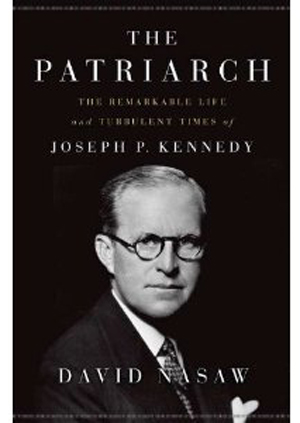The Peculiar Life of Joseph Kennedy
Mini Teaser: From his mercurial personality to his delusions of aptitude in the political realm to his catastrophic diplomatic appointment, a new book provides a thorough account of Kennedy’s life and all of its many highs and lows.
Nasaw gives him too much credit for starting a “great debate” over postwar involvement in Europe and East Asia. It wasn’t much of a debate, and Kennedy didn’t contribute much to it. He never grasped that Hitler was incompatible with Western civilization, that a rampant Nazi Germany was a mortal threat to the United States and that Roosevelt had made the United States the supreme power in the world while Stalin took 95 percent of the casualties in fighting Hitler. America’s prewar rivals—Germany, Britain, Japan, France and Italy—were all docile American allies now, and functioning democracies.
KENNEDY RETAINED his genius for profit and invested intelligently, including in America’s largest building after the Pentagon, the Merchandise Mart in Chicago. It must be said that his most endearing characteristic was his devotion to his children. He was always accessible and concerned, never overly stern or too busy for them. Nasaw believably explains that Kennedy acted reasonably in ordering a lobotomy for his mentally handicapped daughter Rosemary in 1942. When it failed, he was horribly upset and even more so by the deaths of his eldest son Joe Jr., heroically in a 1944 bombing mission, and his universally liked daughter Kathleen, in an air accident in 1948. He made prodigious efforts to assist his surviving sons in their political careers, getting John F. Kennedy’s books “edited,” published and excerpted, financially assisting James Curley back into city hall to open up for Jack the congressional district that had once been held by Rose’s father and contributing tangibly to the effort to keep Joseph R. McCarthy out of Massachusetts when JFK ran for the Senate there in 1952. He had been egregiously tolerant of McCarthy, a red-baiting grandstander who sought to attach the communist label to Roosevelt, Truman, Eisenhower and General George C. Marshall—four of America’s greatest statesmen. The third Kennedy son, Bobby, was McCarthy’s assistant committee counsel for six months.
He contributed generously to his son’s presidential campaign and was a member of the strategy committee. But he did nothing indicating JFK was not his own man. The author suggests John Kennedy shared some of his father’s reservations about overreaching for the defense of Europe, but he soon got over those. This book is not a history of that campaign, but it does pass rather swiftly over the extent of Nixon’s potential grievances. There is little doubt that Illinois—won by Kennedy by less than nine thousand votes out of nearly five million cast, with many ballots missing—was stolen; nor that Nixon won the popular vote, if the votes in Alabama had been allotted fairly between Kennedy and the splinter southern Democrat, Senator Harry Byrd. The many other very close states, including Texas, are not referred to specifically, and the election was really a toss-up. Nixon had a right to contest it, and he deserves credit for not forcing the issue.
Joseph Kennedy, turbulent soul that he was, felt that too few Roman Catholics had voted for his son in 1960 and too many Protestants had voted against him because of his religion. Yet he was rightly jubilant at being father of a U.S. president.
In 1962, Kennedy suffered a stroke that left him half paralyzed, wheelchair-bound and unable to speak. He became a prisoner in his own body, much as his daughter Rosemary was. His thoughts on the assassination of his son can only be imagined, and the similar fate that befell Robert Kennedy nearly five years later finished the father, who died on November 18, 1969, aged eighty-one.
Next to his love of his children, his most admirable quality was his appreciation of classical music. He was a congenial companion and a fine-looking, nattily dressed man. But he excelled only at financial speculation and administration. Apart from his talents as a sire and parental provider and motivator, he was an improbable person to earn the title of this book. And his family, as Marlene Dietrich’s daughter said, all had “smiles that never ended.” They scarcely seem to merit the crazed idolatry they have received. But, thanks to the patriarch, they were numerous, tremendously ambitious, wealthy and led eventful lives. It was really only a dynasty for the decade of the 1960s, a glamorous and tragic meteor of a family that fleetingly brightened the sky of America and then passed on. They were not brilliant exactly, but they were attractive and energetic and remarkable, though only JFK and his wife Jacqueline would qualify as classy. But the thought of what the Kennedys were and might have become lingers yet, and will for a long time.
Conrad Black is chairman emeritus of The National Interest as well as a columnist and biographer of Franklin D. Roosevelt and Richard Nixon. His latest book is A Matter of Principle (Encounter Books, 2012). He was chairman of the London Daily Telegraph from 1987 to 2004 and is a member of the British House of Lords.
Pullquote: The Kennedys were really only a dynasty for the decade of the 1960s, a glamorous and tragic meteor of a family that fleetingly brightened the sky of America and then passed on.Image: Essay Types: Book Review
Essay Types: Book Review 